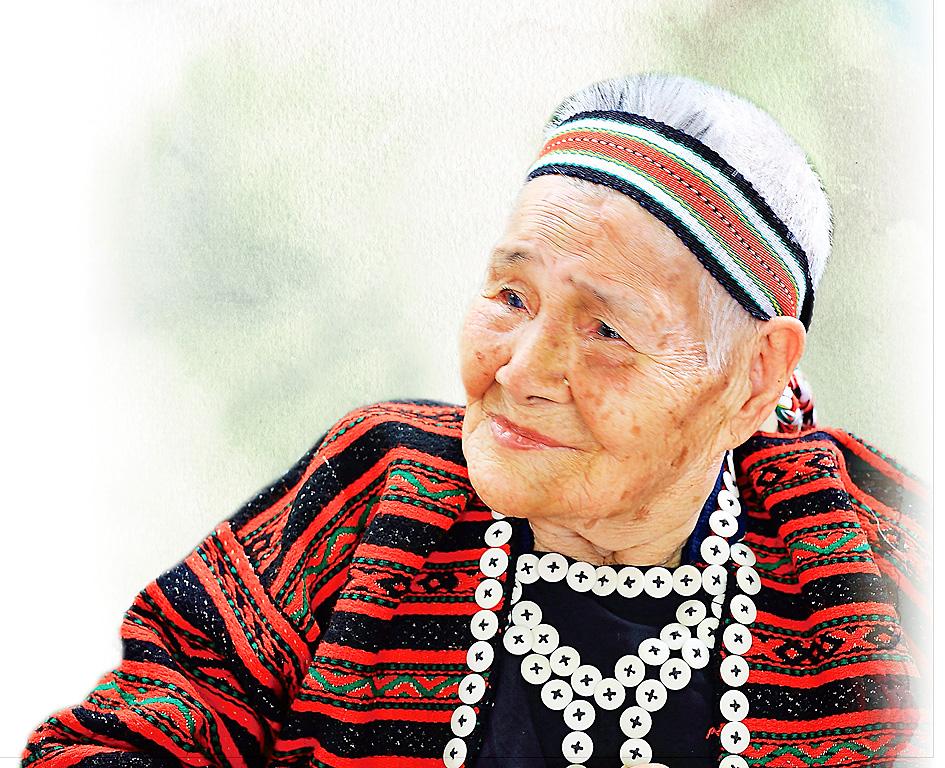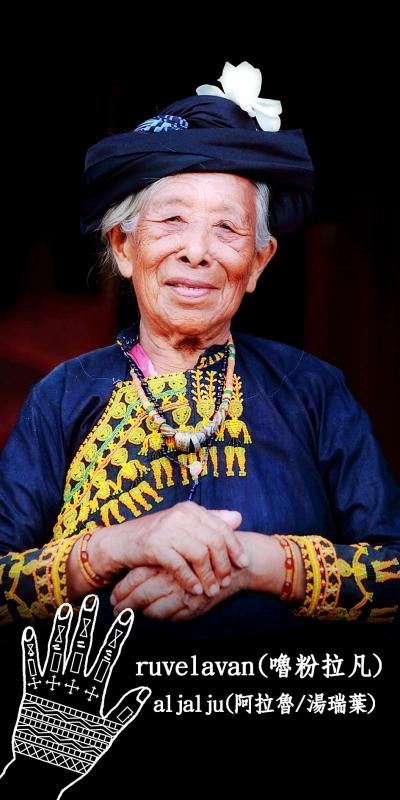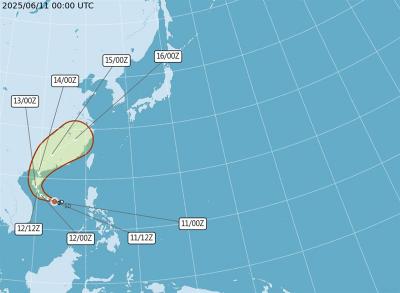Ipay Wilang, the last surviving government-designated preserver of traditional indigenous facial tattoos, passed away on Saturday.
She died at her home in Hualien County, said Kimi Sibal, a Hualien-based historian who cowrote a 2016 book on Taiwan’s then six remaining indigenous facial tattoo preservers.
Ipay Wilang, a Sediq, had returned to Hualien earlier on Saturday after being discharged from a hospital in New Taipei City, said Lo Mei-ching (羅美菁), head of the New Taipei City Indigenous Peoples Department.

Photo provided by the Ministry of Culture
She had been living with her eldest daughter in New Taipei City and was taken to Tucheng Hospital on Friday after she became unwell after catching a cold, Taiwan Indigenous TV reported.
Although her registered birthday was April 1, 1922, Lo said Ipay Wilang was actually 106 years old, because people at the time registered newborns some time after birth.
Council of Indigenous Peoples Minister Icyang Parod said the passing of Ipay Wilang meant that people can now learn about facial tattoo culture only from historic records.

Photo provided by Chen Wen-shan, chief of Nanhe Village in Pingtung County Laiyi Township
He thanked Kimi Sibal, who has been documenting the practices and taken photographs of more than 300 individuals across Taiwan who have the indigenous facial tattoos, and said his council would introduce indigenous culture to more people.
Minister of Culture Lee Yung-te (李永得), whose ministry published the book cowritten by Kimi Sibal, said in a statement that only Atayal, Seediq, Truku and Saisiyat people maintained the tradition of facial tattoos, which is a historically important part of Taiwan’s cultural heritage.
Lee said his ministry would seek a presidential citation to honor the life of Ipay Wilang.
The Hualien County Government in 2009 listed the traditional facial tattoo practices of Atayal, Sediq and Truku as cultural heritage, and named Ipay Wilang as a preserver of the art form in 2016, Lo said.
In the three communities, men can have facial tattoos on their forehead and jaw, and women on their forehead and cheeks when they were deemed capable of starting a family of their own, said Kimi Sibal, who has documented the practices for over two decades.
People with facial tattoos are believed to be able to join their ancestors in the afterlife, he added.
The practice was banned during Japanese colonial rule between 1895 and 1945, and Ipay Wilang was forced to remove her facial tattoo when she was 15, leaving scars on her face, Kimi Sibal said.
Separately, the Council of Indigenous Peoples on Saturday said that Aljalju rulelavan, one of the few preservers of the Paiwan women’s hand tattoo tradition, has passed away at the age of 93.
Aljalju died on Monday last week in Pingtung County’s Laiyi Township (來義), the council said.
Council Deputy Minister Calivat Gadu, a Paiwan, visited the township on Saturday to pay his respects and posthumously bestow on Aljalju the Third Class Award for Contribution to Indigenous Peoples, in recognition of her status as a preserver, the council said.
Aljalju was one of seven remaining culture conservationists in the township, who were certified last year by the Pingtung County Government in recognition of their preservation of veci’nua lima, the traditional hand tattoos of Paiwan women.
Traditionally, with the approval of the entire village, a woman may seek the village chief’s permission to obtain the tattoos, which reflect her social and familial status in the Paiwan culture, the council said.

A magnitude 6.4 earthquake struck off the coast of Hualien County in eastern Taiwan at 7pm yesterday, the Central Weather Administration (CWA) said. The epicenter of the temblor was at sea, about 69.9km south of Hualien County Hall, at a depth of 30.9km, it said. There were no immediate reports of damage resulting from the quake. The earthquake’s intensity, which gauges the actual effect of a temblor, was highest in Taitung County’s Changbin Township (長濱), where it measured 5 on Taiwan’s seven-tier intensity scale. The quake also measured an intensity of 4 in Hualien, Nantou, Chiayi, Yunlin, Changhua and Miaoli counties, as well as

Taiwan is to have nine extended holidays next year, led by a nine-day Lunar New Year break, the Cabinet announced yesterday. The nine-day Lunar New Year holiday next year matches the length of this year’s holiday, which featured six extended holidays. The increase in extended holidays is due to the Act on the Implementation of Commemorative and Festival Holidays (紀念日及節日實施條例), which was passed early last month with support from the opposition Chinese Nationalist Party (KMT) and Taiwan People’s Party. Under the new act, the day before Lunar New Year’s Eve is also a national holiday, and Labor Day would no longer be limited

COMMITMENTS: The company had a relatively low renewable ratio at 56 percent and did not have any goal to achieve 100 percent renewable energy, the report said Pegatron Corp ranked the lowest among five major final assembly suppliers in progressing toward Apple Inc’s commitment to be 100 percent carbon neutral by 2030, a Greenpeace East Asia report said yesterday. While Apple has set the goal of using 100 percent renewable energy across its entire business, supply chain and product lifecycle by 2030, carbon emissions from electronics manufacturing are rising globally due to increased energy consumption, it said. Given that carbon emissions from its supply chain accounted for more than half of its total emissions last year, Greenpeace East Asia evaluated the green transition performance of Apple’s five largest final

The first tropical storm of the year in the western North Pacific, Wutip (蝴蝶), has formed over the South China Sea and is expected to move toward Hainan Island off southern China, the Central Weather Administration (CWA) said today. The agency said a tropical depression over waters near the Paracel and Zhongsha islands strengthened into a tropical storm this morning. The storm had maximum sustained winds near its center of 64.8kph, with peak gusts reaching 90kph, it said. Winds at Beaufort scale level 7 — ranging from 50kph to 61.5kph — extended up to 80km from the center, it added. Forecaster Kuan Hsin-ping